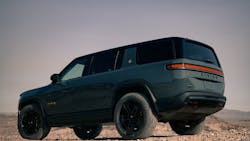EV Notes: Mullen Regains Control of Bollinger Motors Subsidiary
As the electric vehicle transition marches steadily along, companies are thinking bigger than just getting their products to market. With more EVs on the road than ever, leaders are looking to diversify their offerings while still saving money—and it’s not limited to the all-electric manufacturers, either.
Mullen Lifts Bollinger Motors Stake to 95%
Electric van manufacturer Mullen Automotive has upped its stake in its own subsidiary, Bollinger Motors, by 21%, the company announced June 2. The investment brings Mullen’s total ownership in the electric truck maker to 95%.
Mullen originally acquired majority ownership of Bollinger back in September 2022 with a 60% stake but last month lost control of the company after Bollinger’s founder, Robert Bollinger, filed a lawsuit alleging that Mullen had breached an October 2024 contract concerning a $10 million secured promissory note. That led to Bollinger Motors being placed into a court-appointed receivership on May 7.
According to a filing by Mullen, the company will pay Robert Bollinger $11 million “in connection with the dismissal of the lawsuit and release of the company and Bollinger of all claims and liabilities,” as well as pay the expenses associated with the receivership beginning on May 26. In response, Robert Bollinger transferred his remaining shares to Mullen.
“This is an important moment for both Mullen Automotive and Bollinger Motors,” said David Michery, Mullen’s CEO. “Our investment in acquiring the vast majority of remaining shares and resolving certain significant outstanding debt demonstrates our belief in and continued commitment to Bollinger's vehicle lineup and future.”
Rivian to Refinance $1.25 Billion with Green Notes
In an attempt to refinance $1.25 billion in senior secured notes due next year, leaders at Rivian Automotive plan to offer that same amount in senior secured green notes due 2031. The expected net proceeds, along with Rivian’s cash on hand, are expected to cover the full amount.
According to a filing by Rivian, part of the reason behind the offering relates to a Department of Energy loan the company closed on earlier this year. To fund the DOE loan, which will be used to build Rivian’s second factory, the company must either get consent from its creditors or terminate, amend, or refinance its senior notes. Rivian chose the latter option.
Stellantis Invests in Extended Range EVs
The world’s fourth-largest automaker, Stellantis N.V, has faced recent EV-related troubles. Despite its goal to have all European passenger cars and U.S. light-duty trucks sales be electric by 2030, the company has faced delays on its electric offerings, including pushing the all-electric Ram 1500 REV from late 2024 to mid-2027. To combat that, the company is pivoting to hybrid offerings for the United States.
At the May 29 Bernstein Strategic Decisions conference, CFO Doug Ostermann said bringing hybrid technology to Stellantis’ wide range of vehicles—which includes Chrysler, Jeep and Alfa Romeo as well as Ram—will allow the company to bring back larger, higher-horsepower powertrains that were “very profitable” in the past, as well as “real drivers” of brand character.
“When you think about Dodge and the fan base that's out there, those are the powertrains that they love. And they drive the image of the brand. And so, I think bringing some of those things back is going to be really exciting for us,” Ostermann said.
One part of the BEV transition that has been tough in the States, according to Osterman, has been battery pricing. While smaller passenger vehicles and sedans are popular in Europe, SUVs and pick up trucks are the best-selling segment in America. In order to get a decent range, the battery must be larger but comes at the sacrifice of weight and profit. Stellantis’ solution? Range extenders.
In the upcoming RamCharger hybrid truck, while the battery will be half the size and rely on an electric powertrain, it can be charged while the vehicle is in motion thanks to a gas-powered generator. The vehicle is expected to begin production next year and will have a 690-mile range and 14,000-pound towing capacity. While the technology is more commonplace in China, it’s still in relative infancy in the West. The last extended range EV sold in the United States was the BMW i3, which was discontinued in 2022.
Blink Collaborates on ‘Seamless Charging’
Blink Charging Co. is partnering with ChargeHub and WirelessCar to launch the Seamless Charging pilot program in North America, which combines the three firms’ infrastructure, app and connection services to make EV charging a more efficient experience.
Seamless Charging was created by WirelessCar, which focuses on digital vehicle services such as emergency calling and toll charging, while ChargeHub operates Passport Hub, one of the most popular EV roaming services.
Rather than downloading and logging into multiple apps, EV drivers can instead register for ChargeHub’s app and activate the “Seamless Charging” feature, which allows them to plug into any Blink Charging Station. WirelessCar’s connected-vehicle data allow drivers to be notified of payment, charging status and more.
Blink and ChargeHub have worked together before. Last October, leaders of the two signed an EV roaming agreement that allowed Blink Chargers to be visible in ChargeHub’s network of e-mobility service providers (eMSPs) app, which has more than one million users.
